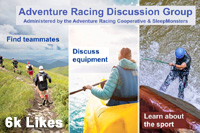The Three Peaks Yacht Race
The Three Peaks - By Boat, Bike and Foot
Stuart Walker (Team Wight Rose) / 17.06.2014


“The Three Peaks” – it probably conjures up different images to different people … To me, the first question is Yorkshire or National? The Yorkshire 3 Peaks race is a fantastic fell race, but that’s not what this is about … The national three peaks, Snowdon in Wales (just over 1000m), Scafell Pike in the Lake District (998ish) and Ben Nevis in Scotland (1350 or so), have been tackled many ways: My brother has completed the classic 24 hour challenge, I climbed all three during my British Isles Challenge a few years ago, and Dark Peak’s Gavin Williams recently managed the same in 23:30 by public transport and bicycle. However, last weekend I was starting a different event – the Three Peaks Yacht Race.
As the name suggests, it’s a race up Snowdon, Scafell Pike and Ben Nevis, linked by sailing! It’s a classic event that’s been going since 1979. I was thrilled to be taking part this year as part of the “Wight Rose” team aboard Geoff West’s boat, Lightning Reflex. I would be running with Alex Pilkington from the Mountain Hardware Adventure Racing team, and with Geoff the sailing team was made up of Gary Clayton and John Donnelly. Between them these guys have won the race a lot of times, and there was really no better team to be part of. The race was a brilliant adventure and one I could easily write loads and loads about so I’ll try to keep it short by writing a little bit about each of the six legs …
Leg 1 – Barmouth to Caernarfon:
Alex and I arrived at the start in Barmouth on Saturday morning, ready for the race start at 4:30. We checked in, had our kit checked, and found some bacon sandwiches. The weather was a bit gloomy but having heard the horror stories of seasickness-inducing swell in the harbour last year we were glad to see the calm water.
We met the rest of our team for the first time at the race briefing, and immediately discovered that Gary and Alex had actually worked together quite a lot in the past! I had been introduced to Geoff through my father-in-law, so despite only assembling on the morning of the race we all felt like we knew each other a bit. After a bit (a lot) of shopping we loaded up our bags, food and bikes onto a water taxi and headed for the boat. Finally we were on board and ready to go …
At 3:30 the boats were led out of the harbour by the Barmouth Lifeboat, there was quite a crowd on the harbour wall, including drummers and cheering locals – we felt like minor celebrities! Then at 4:30 the final flare was fired and we were underway … Except we weren’t, because there was no wind! Out came a unique feature of this race, the oars. Rowing isn’t allowed in normal yacht racing, but in this race it’s often an important strategy, and all the teams were soon crawling their way up the coast towards Caernarfon.
The boats were all very close for a long time, with the Army boat “British Soldier” and “Moby J” with super-runners Adam and Chris Perry on board out in front of us for much of the leg. Towards the end we caught Moby J and were sailing along in second, but by the time we landed in Caernarfon the army had about 30 minutes on us. I had been worrying that we had been a bit complacent early on (we were the last to get our oars out!) but was assured by the sailors that I shouldn't panic, and that there was still a very long way to go.
However, a critical part of the race was about to come into play: Tides. If you’re not familiar, the water level on any tidal water rises and falls, with about 6 hours between high and low levels. This causes a current which can pull you along if you get it right, or push you back where you came from if you get it wrong. It also means that you might not be able to sail a boat with a big keel underneath it into a shallow harbour at low tide, meaning you might have to wait outside …
So, when we arrived at Caernarfon at 2:25 on Sunday morning, we knew that it was critical we took the minimum time possible, in order that we could leave as close to high tide as possible to sail through the tricky Menai Straits.
We knew that the Army boys had set off about half an hour in front of us and were quietly confident of catching them, but when a fender was dropped on the approach to the mooring the calm disappeared and things were a bit chaotic when we landed. This meant that some idiot (me) forgot to pick up the GPS tracker from the boat and put it in his rucksack, meaning a lost few minutes as we phoned Geoff to sail back to the pontoon and pass it across. Not a great start to our running but at least we were underway.
The Snowdon leg involves a 7 mile road run in to the hill, then the climb, a descent of the other side of the hill to Llanberis, and another 7 miles road back to the boat. Neither Alex nor I are road runners and we knew we would suffer on this bit, but we tried to run reasonably hard, balancing the need to be back ASAP for the tide but not knacker ourselves for a race later on. Unfortunately I was struggling a bit with stomach problems and needed a couple of little stops on the way up the hill which cost us another few minutes, but after the road section was out of the way we ran well up to the summit.
We passed the Army runners not too far from the top and were pleased to be leading the race. At the top we were astounded by the number of people around, it was basically the middle of the night yet we had to run off the path to get around all the (presumably) three peaks walkers, it was bonkers! First light appeared on the way down and by the time we hit the road it was daylight. The road was predictably horrible, Alex certainly ran this section better than me and for the last few miles I just tucked in behind and held on. My stomach was still not right, I wasn’t seasick and had felt fine on the boat, I think I need to have a proper look at my diet and see why this keeps happening.
Anyway, we were back on the boat after a leg time of 3:56, not the fastest (Adam and Chris would take 20 minutes out of us on this leg, and the runners from Mistral 13 minutes) but crucially the first back: Over to the sailors …
Leg 3 – Caernarfon to Whitehaven:
You could argue that this leg is the crux leg of the race. From Caernarfon we were soon past Britannia Bridge and into an area called the Swellies: The tide was against us and there was very little wind, the laws of physics seemed to suggest that we would certainly grind to a halt. Geoff and the guys did some incredible sailing, the instruments showed nothing pushing us forwards and lots pushing us backwards but we somehow gradually crept forwards, until eventually we made it past the second bridge and out into an easier area. We’d done it, Moby J had been very close behind at one point but seemed to have stopped close to the first bridge. It looked like we had got a bit of a gap on the boats behind and we were all elated. I can’t remember exactly, but I suspect we probably had some cake to celebrate.
However, it was still a long way to the next run start in Whitehaven. From Caernarfon to Whitehaven took us 14:08, and were actually beaten by two other boats: The Belgians (Twinracers@Denebota) in 13:37 and British Soldier in 12:36. The British Soldier boat is very fast, it’s a brand new J111 and they sailed it very well. It’s only disadvantage in comparison to Lightning Reflex is that it uses a bowsprit rather than a spinnaker pole, so when sailing absolutely downwind they need to gybe (zig-zag, like tacking but with the wind from the back) whereas we don’t. So, by the time we arrived in Whitehaven we only had about a 50 minute gap on the Army, and 1:30 on the Belgians.
Leg 4: Scafell ride / run:
Since Whitehaven is actually quite far from Scafell Pike, racers use bikes to ride 13 miles in to the Ennerdale valley before starting the run. We had opted for road bikes with decent tyres since most of the ride is on tarmac tracks and roads, with only the last couple of miles to the checkpoint (just after Ennerdale YHA) on metalled road. The ride in went well, except for the midges at the checkpoint, and soon we were on our way along the track on foot. Again my tummy wasn’t great, but uphill I felt OK and as the climb got steeper it wasn’t so much of a problem.
The Scafell leg actually has the most climb of all three because the route goes up Black Sail Pass, then descends to Wasdale before climbing up to Scafell Pike itself. We clipped our card on the summit (in the dark, again!) and headed back to Wasdale, then up 500m again to Black Sail Pass. As we climbed we started to see other teams: The Army, Mistral, the tentatively-descending Belgians, and team Perry from Moby J. We didn’t know at this point but Chris was struggling with an injury, and by the time we’d cycled back to Whitehaven we had recorded a time of 7:16, compared to 7:25 for Mistral, 8:06 for Moby J and 9:43 for British Soldier.
The ride back was fantastic, Alex had a few problems with his electric gears but other than on the steep climbs it didn’t slow us down much. The ride back was quicker than the one out and we had a great time on the fast cycle route, until we arrived back into the harbour and realised that the sailors weren’t there! We looked around the marina and saw a few 3PYR boats, but not Lightning Reflex…
We tried phoning to no avail and started to get a bit pissed off, then we realise that there was a second harbour! Finally we found them, but there was still not much action on board – it turned out that they had slept through the alarm! Geoff, John and Gary were very apologetic and we soon got the bikes on board and ready to go. However, it turned out that we didn't actually need to worry, once again the tide would play a big part in this race.
Leg 5: Whitehaven to Corpach:
We couldn’t get out of the harbour until the tide rose sufficiently, so we were now a sitting duck for the rest of the fleet. I think it was about 4:30 when we arrived, and we had to wait till about 5:30 to get through the lock gate and back out into the sea. As we left we were still in the lead but beginning to think about how far behind the others would be, we didn’t know how long they had taken on Scafell Pike and they wouldn’t have to wait as long to get through the lock as we did …
Next was the longest leg of the entire race, about 210 nautical miles from Whitehaven to Corpach. The sail up north was fantastic, particularly once we got up to Scotland the view was amazing. During the night we were able to sleep while the sailors sailed in four hour shifts through not very much wind: I think they definitely get the harder side of the bargain in this race! We didn’t know at the time, but we had about 3 hours on British Soldier as we left Whitehaven. However, the most exciting part of the race was about to unfold. Our families and friends watching the race on the tracker at home started to notice British Soldier getting closer to us with each half hour update, and as the wind started to drop near the Mull of Kintyre we could see sails on the horizon.
Over the next few hours I could hardly take my eyes off the boat catching us… First we could just see sails and almost persuaded ourselves that it could be a non-race boat, then as the wind dropped we could see oars – so it was certainly British Soldier… They were sailing quickly and despite John and Gary’s brilliant sailing they gradually got closer. At 10am Geoff came on watch, we could now see the Army sailors clearly, and over the next half hour or so they passed and pulled out a gap of maybe a kilometre on us. It was now not far from the end of the race, surely we wouldn't lose it so close to the finish?!
We hoped we could outrun them on Ben Nevis, but we didn’t want to be behind as we arrived in Corpach. The Army were competing for the Tilman Trophy, which meant that all their team would be required to go to the top of a mountain. We hoped that this meant their runners might not be the fastest, but as we crept through Corran Narrows I was very nervous and just wanted to get on the hill.
Finally, after 39 and a half hours sailing since Whitehaven we landed in Corpach about four minutes behind British Soldier, the race was on. We jumped off the boats and set off up The Ben …
Leg 6: Ben Nevis Run:
Finally, a mountain in daylight! We left at 8pm or so and headed along the waterfront towards Fort William. We actually caught and passed the three Army runners after less than a kilometre of running, so we knew that all we really needed to do was to keep going and not make any spectacular mistakes! The run this time involved a couple of miles of flat road and track through Caol village and up to the Ben Nevis Inn before starting the steep climb up to the summit. My stomach was a bit better this time and I enjoyed the run, particularly once we began the proper ascent.
We saw Rob Howard from SleepMonsters.com just after the Inn, and ran at a good pace up the rocky track to the checkpoint at about 600m. After clipping the checkpoint we had another 700m or so to climb and were still going well, the weather was reasonable and it was still light. Above this point it got a bit cloudy in places so we stuck to the zigzag path rather than taking any potentially embarrassing shortcuts. Alex told me our climb rate was good (18m/min I think), my legs felt good and I was enjoying myself – and beginning to believe we would actually win this race!
The other question was whether we could win the “King of the Mountains” trophy for the fastest combined time on the three mountains. We had lost out on Snowdon to Moby J and Mistral, but had taken time back on both on Scafell Pike to leave us only four minutes behind Mistral. Chris’ injury left Moby J out of the race. We didn’t know the numbers at the time but thought it was close, so once we’d crossed the snowfields near the summit (with snow under our feet and cloud surrounding us it was a bizarre environment!) and clipped at the top we tried to push on down the mountain. I remember it being exactly 2 hours by my watch from Corpach to the summit, and we hoped to be back in around 3:00 – 3:10. With a 30 minute run in from the Inn it was going to be tight!
The descent was fantastic fun, helped by the fact it was light for once and the knowledge that we were going to win the race we ran well down the loose rock and scree, then out of the cloud onto the fixed rock path to the Ben Nevis Inn. The final run in was always going to hurt, and it did. We hit the tarmac and ate the last of the Shot Blox and jelly sweets then dug in and tried to set as good a time as we could. I think Alex and I were even along here, which felt good for me as apart from on the climbs I had felt like the weaker runner for most of the race.
Soon we were back into civilisation, across Soldier’s bridge and then heading back along the edge of the sea to Corpach lock. Alex had a touch of cramp just 50m or so from the end so hobbled a bit, but we managed to run quickly together in to the finish. Geoff, Gary and John were there with the race marshals as we crossed the line, and it wasn’t long before a bottle of champagne appeared, which Alex popped and sprayed over the rest of us!
We’d done it – Team Wight Rose had won the race. The sailors were awesome, I still think they have the hardest job in the race and I’m still not sure how they did some of the physics-defying sailing through the Menai Straits and up the Scottish coast! Alex had been a great running partner, and thanks to him for doing most (if not all) of the navigation too – there’s not much in this race but having someone who can do it so efficiently does make a difference … and apologies for holding you up with my toilet stops.
No other teams had set off when we arrived, but later that night Mistral and Moby J arrived. The Mistral runners set a blistering time of 3:08 on the Ben, 10 minutes quicker than us, to win the King of the Mountains trophy by 14 minutes. We had showers and went back to the boat for a few beers, soon to be joined by the Army support crew and later by the Moby J sailors. We went to watch the British Soldier runners finish and win the Tilman trophy then headed off to sleep.
I’m chuffed to have won the race. I guess I am slightly disappointed not to have won the King of the Mountains too, but the guys who did are quality runners, and at least we won the Scafell Pike leg. The main objective was the overall win and I’m really pleased with that, and of course the “Wrinklies” trophy for the oldest total team age!
The Three Peaks Yacht Race is a unique and fantastic event, a true adventure and a great race.
Thanks to all the organisers, marshals, everyone who watched the tracker, and to Geoff, Gary, John and Alex.







 SleepMonsters
SleepMonsters



